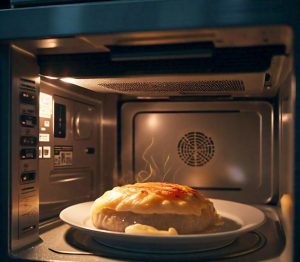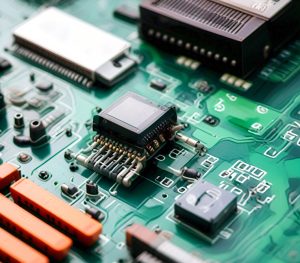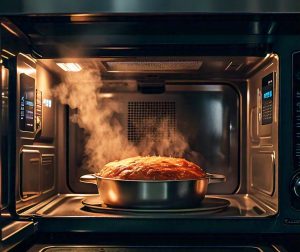A circuit, in electrical terms, is a path around which electric current can flow.
The question at hand is whether a refrigerator and microwave can be on the same circuit.
In this article, we will delve into the technicalities of power circuits and their capacity to handle multiple appliances like refrigerators and microwaves simultaneously. We will discuss if it’s feasible and safe to have these two appliances – a refrigerator and microwave – on the same circuit or not. In addition, the expected power consumption of these appliances, along with their potential impact on your household wiring system will also be examined. If it turns out that having them on one circuit isn’t advisable then alternatives would be suggested along with some precautionary measures to ensure safety while using these utilities in your house. Frequently asked questions related to this topic will also be answered for further clarification.

Jump To:
Can a Refrigerator and a Microwave be on the Same Circuit?
In the first instance, it’s important to note that a refrigerator and microwave can technically be on the same circuit. However, this is generally not recommended as it may overload the circuit due to their combined high-energy consumption. It’s best practice to have these appliances on separate circuits for optimal safety and performance. This advice applies not only to refrigerators and microwaves but also to other large appliances of similar power demand.
Check out if you can plus a microwave into a power strip.
Facts About a Refrigerator and a Microwave on the Same Circuit
Here we will discuss important things to note about having a refrigerator and microwave on the same circuit.
- Voltage: Both appliances are designed for a standard household voltage of 120 volts.
- Ampere Rating: The fridge typically uses around 7-10 amps, while a microwave generally pulls about 13-14 amps.
- Circuit Load: This refers to the total amount of power drawn by all devices connected to a circuit. A common recommendation is that the total load should not exceed 80% of the capacity of a circuit.
- Safety Concerns: If both appliances were to run at full power simultaneously, they might overload a standard residential electrical circuit, causing it to trip or potentially leading to fire risk.
- Dedicated Circuits: Large appliances like refrigerators often require their own dedicated circuits due to their high-power consumption needs. It’s safer and more reliable if these two are on separate circuits
We’ve discussed various aspects related to keeping your refrigerator and microwave on one single electrical circuit. Now let’s delve into some other specifics regarding using these two major kitchen appliances.
Check out how hot a microwave can get.
What are the Alternatives to Having a Microwave and Refrigerator on the Same Circuit?
An alternative to using a microwave on the same circuit as your refrigerator is to have them on separate circuits. This prevents overloading of the circuit, which could lead to potential electrical faults or fires. Another option includes utilizing other cooking appliances such as a toaster oven, electric grill, or stove that can be operated on different circuits.
Tips for Safely Microwaving with a Refrigerator on The Same Circuit
Here we will discuss the important things to note about connecting a microwave and a refrigerator on the same circuit:
- Make sure both appliances are properly installed and grounded.
- Avoid operating both devices at high power simultaneously to prevent overloading of the electrical circuit.
- Regularly check your household wiring and fuses/circuit breakers for any signs of wear or damage.
- If you notice any issues like flickering lights or tripping breakers when running these two appliances together, contact an electrician immediately.
- Lastly, consider having an additional dedicated circuit installed by an expert if usage causes regular disruptions in the power supply.
In conclusion, safety should be paramount when dealing with household electrical appliances like refrigerators and microwaves. It is advisable not to run heavy-duty electrical equipment concurrently without adequate precautionary measures in place.
These FAQs address some common concerns regarding this topic.

Frequently Asked Questions (FAQs)
We will now look at the most commonly asked questions related to using a refrigerator and microwave on the same circuit.
Can a refrigerator and microwave be on the same circuit?
No, it is not recommended to have a refrigerator and microwave on the same circuit. Appliances like these with high power usage should each have their dedicated circuits to prevent overwhelming the system, leading to potential electrical fires or damaging the appliances.
Why shouldn’t a refrigerator and a microwave share the same circuit?
The reason why a refrigerator and microwave shouldn’t share one circuit is because they both draw significant electricity. Plugging them into one circuit could easily overload it when both appliances are operating simultaneously, possibly causing breakers to trip or wires to overheat.
What can happen if a refrigerator and a microwave are on the same circuit?
If you plug your refrigerator and microwave into the same circuit, there’s an increased risk of tripping the breaker due in part to exceeding its load capacity. This can not only cause inconvenience but also damage your appliances or cause electrical fires if unnoticed for long periods of time.
How can I prevent overloading when using both a refrigerator and a microwave?
To prevent overloading when using both a fridge and microwave, ensure they’re plugged into separate circuits. It helps distribute power consumption evenly across different areas of your home’s electrical system which reduces chances of overheating and damaging equipment in case of sudden power surges.
Check out if a microwave oven can increase its temperature on the highest power setting.
We hope this section addressed some common concerns about using refrigerators and microwaves together on the same electric circuit!
Final Word
In conclusion, while it may appear convenient to connect multiple large appliances like refrigerators and microwaves on the same electric circuit, it is not advisable due to safety reasons. Overloading a single circuit with high-energy appliances can lead to numerous potential hazards such as triggering circuit breakers or causing electrical fires. It’s always best to consult with an experienced electrician when planning your home’s electrical layout for optimal safety and convenience.



